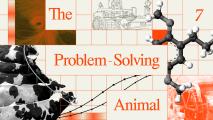An Israeli startup is looking to bring fecal testing to your own personal throne — a “smart toilet bowl,” as the Times of Israel puts it, that monitors your poop and your health.
The clip-on device uses AI-powered computer vision and multi-spectral sensors to analyze your, um, leavings. Using their algorithm, the device measures the chemical composition of the stool as well as its… physical characteristics.
The current clinical focus of their fecal testing is looking for blood hidden inside the stool, which can be an early sign of colorectal cancer. Additionally, they can assay for dehydration and urinary tract infections, as well as constipation and diarrhea (although why one would need a device to know if either of those were happening eludes me).
“We can see molecular composition and substances in urine and stool in a sensitive way that the human eye has no perception for by using spectroscopic signatures of molecules,” OutSense CEO Yfat Scialom told VentureBeat.
All the data is uploaded into OutSense’s cloud for analysis, the Times of Israel reports, to be delivered to you or your healthcare provider. If something is amiss — say, the presence of blood — a notification gets sent out.
OutSense is looking to begin with remote monitoring of elderly populations. Their fecal testing device has gone through a clinical trial at Israel’s Meir Medical Center in Kfar Saba, which found the device capable of measuring blood in stool with 90% accuracy.
The company plans on doing larger pilot studies at hospitals in Israel and with an as-yet-unnamed Japanese business that specializes in remote monitoring tech for the elderly. They’ll be using their fecal testing device to scan for dehydration and UTIs, per the Times.
To dial in their device, OutSense also needed to build its own poop catalogue, working with labs and hospitals to acquire the data needed to train its AI.
“To the best of our knowledge, such data does not exist elsewhere,” Scialom told VentureBeat.
Fecal testing can be a filthy rich source of data. Dutch researchers have used sewage to help track coronavirus infections at a municipal level, while a pilot program to scan finishing barns for pig viruses could be the type of tool to help us avoid another pandemic.
One can almost smell the possibilities.






